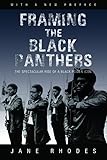Framing the Black Panthers : the spectacular rise of a Black power icon / Jane Rhodes ; with a new preface.
Material type: TextLanguage: Spanish Publisher: Urbana, IL : University of Illinois Press, [2017]Description: xxxiv, 404 pages, 8 unnumbered pages of plates : illustrations ; 24 cmContent type:
TextLanguage: Spanish Publisher: Urbana, IL : University of Illinois Press, [2017]Description: xxxiv, 404 pages, 8 unnumbered pages of plates : illustrations ; 24 cmContent type: - text
- unmediated
- volume
- 9780252082641 (pbk. : alk. paper)
- Spectacular rise of a Black power icon
- Black Panther Party -- History
- Black Panther Party -- Public opinion
- Black Panther Party -- Press coverage
- Journalism -- Political aspects -- United States -- History -- 20th century
- Mass media -- Political aspects -- United States -- History -- 20th century
- African Americans in mass media
- African Americans -- Race identity -- History -- 20th century
- Black power -- United States -- History -- 20th century
- Public opinion -- United States
- Periodismo -- Aspectos políticos
- Medios de comunicación -- Estados Unidos. -- Aspectos políticos
- Opinión pública -- Estados Unidos
- United States -- Race relations -- Political aspects -- History -- 20th century
- Estados Unidos -- Relaciones raciales -- Aspectos políticos -- Historia -- Siglo XX
- 322.4/209 23
- 002 E 185.615 R476f 2017
| Item type | Current library | Home library | Collection | Shelving location | Call number | Copy number | Status | Date due | Barcode |
|---|---|---|---|---|---|---|---|---|---|
 Libro
Libro
|
Biblioteca Juan Bosch | Biblioteca Juan Bosch | Recursos Regionales | Recursos Regionales (2do. Piso) | 002 E 185.615 R476f 2017 (Browse shelf(Opens below)) | 1 | Available | 00000128087 |
Includes bibliographical references (pages 337-385) and index.
Forty years in hindsight : the Black Panthers in popular memory -- Black America in the public sphere -- Becoming media subjects -- Revolutionary culture and the politics of self-representation -- Free Huey: 1968 -- A trial of the Black Liberation Movement -- From campus celebrity to radical chic -- Servants of the people : the Black Panthers as national and global icons -- The rise and fall of a media frenzy : the 1970s -- Conclusion.
"The 1960s may be over, but the Black Panthers--the ultimate symbol of black power, radical inspiration, and the excesses of the decade--live on. Books on the Panthers continue to be written, hip-hop artists continue to draw inspiration from them, and so many films are made about the Panthers that there is now an annual Black Panther film festival. Cultural historian Jane Rhodes examines the extraordinary staying power of the Panthers in the American imagination by probing their relationship to the media. Rhodes argues that once the media and pop culture latched onto the small, militant group, the Panthers became adept at exploiting and manipulating this coverage--through pamphlets, buttons, posters, ubiquitous press appearances, and photo ops--pioneering a sophisticated version of mass media activism. Paradoxically, the news media participated in the government campaign to eradicate the Panthers while simultaneously elevating them to a celebrity status that remains long after their demise. This new edition will feature a new preface putting the Panthers relationship with the media in context with Black Lives Matter and recent activism against racial profiling and police brutality."--Provided by publisher.


There are no comments on this title.